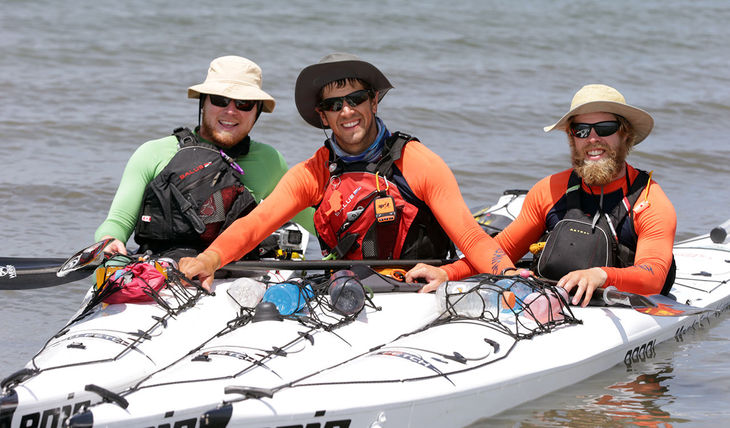On July 15, 2015, The Yucatan Times posted an article about a daunting kayak expedition from Canada to Yucatan. Here is an update on the voyage.
Three Quebec men are in the home stretch of a voyage that is taking them from Montreal to Mexico — by kayak.
Julien Granger, Luc Labelle and Nuka De Jocas-McCrae left home May 16, 2015. This week, they’re in the Gulf of Mexico about 50 kilometres east of Veracruz.
The physical toll the trip has taken has been difficult, but the three paddlers hope to reach their final destination, Rio Largartos, Yucatan, in September.
“It’s hurts,” says Granger. “But it’s not that crazy after a year.”
They still have about a 1,000 kilometres of paddling to go.
“We’re arriving at the hardest part of it right now, the most isolated places,” said De Joncas-McCrae. “The fact that we’re always on the coastal side now, there’s not inner coastal waterway here, so we have to deal with the breaking waves. That can be dangerous [with] the extreme heat and humidity.”

The three kayakers one year ago in an early leg of their expedition. (PHOTO: pressofatlanticcity.com)
The trip started gradually. The first weeks were on rivers, taking the Richelieu to the Hudson. In New York City, they headed south, hugging the Eastern seaboard. Then, they cut through Florida on canals and Lake Okeechobee, before finally circling the Gulf of Mexico.
Labelle said the men have seen sharks and alligators. but the biggest dangers are on shore. They have to watch where they camp, avoiding snakes, scorpions and spiders.
“Mother nature has been fairly nice,” said De Joncas-McCrae. They’ve had good weather most of the trip, but have had some rough patches. Last month, they camped on the beach in Northern Mexico during a tropical storm.
“Every time we’re in a bad situation, there’s someone to help us out,” said Granger.
The men have met hundreds of people on their journey and are shocked by how helpful people have been. “There are always people who are there who want to take care of what we need. It’s great to see that.”
“We began with being helped by our families and friends,” said Labelle. “It kept on going with people we’ve met on the way.
One thing they’ve gotten used to is the shock from people when they explain their expedition. They say they often have to explain it slowly, and then explain it again a second time.
The men are documenting their trip online. They have a YouTube channel and a Facebook page.
They plan to visit schools when they return to Canada, to share the experience with students.
Source: globabnews.ca

